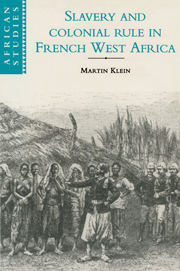Book contents
- Frontmatter
- Contents
- List of illustrations
- List of maps
- List of tables
- Preface
- List of abbreviations
- Glossary
- 1 Slavery in the Western Sudan
- 2 Abolition and retreat. Senegal 1848–1876
- 3 Slavery, slave-trading and social revolution
- 4 Senegal after Brière
- 5 Conquest of the Sudan: Desbordes to Archinard
- 6 Senegal in the 1890s
- 7 The end of the conquest
- 8 The imposition of metropolitan priorities on slavery
- 9 With smoke and mirrors: slavery and the conquest of Guinea
- 10 The Banamba Exodus
- 11 French fears and the limits to an emancipation policy
- 12 Looking for the tracks. How they did it
- 13 After the War: renegotiating social relations
- 14 A question of honor
- Appendixes
- Notes
- Bibliography
- Index
- Titles in the series
4 - Senegal after Brière
Published online by Cambridge University Press: 07 May 2010
- Frontmatter
- Contents
- List of illustrations
- List of maps
- List of tables
- Preface
- List of abbreviations
- Glossary
- 1 Slavery in the Western Sudan
- 2 Abolition and retreat. Senegal 1848–1876
- 3 Slavery, slave-trading and social revolution
- 4 Senegal after Brière
- 5 Conquest of the Sudan: Desbordes to Archinard
- 6 Senegal in the 1890s
- 7 The end of the conquest
- 8 The imposition of metropolitan priorities on slavery
- 9 With smoke and mirrors: slavery and the conquest of Guinea
- 10 The Banamba Exodus
- 11 French fears and the limits to an emancipation policy
- 12 Looking for the tracks. How they did it
- 13 After the War: renegotiating social relations
- 14 A question of honor
- Appendixes
- Notes
- Bibliography
- Index
- Titles in the series
Summary
The concession of land whether for the route, for the stations, for stopping places can in no way involve rights over surrounding areas in favor of the French, nor serve as a refuge for subjects of the Darnel who wish to withdraw themselves from his authority.
As a consequence, no subject of Cayor can enter the interior of the concession without the express authorization of the Darnel.
Treaty of 1879 with Lat DiorWhen Brière de l'lsle arrived in Senegal as governor in 1876, Senegal was still largely a collection of commercial posts, but France ruled about 200,000 people. The population of the communes was almost twice what it had been in 1848, trade had increased, and peasant production was expanding on the mainland. French trade with Kajoor hit 3 million francs a year in 1874. Millet, cotton and peanuts were being traded in the upper Senegal river area. Brière picked up where Faidherbe left off. In a series of military and diplomatic efforts, he tightened control over the Senegal river, the peanut basin and the Guinea coast. He also initiated a railroad project that began the occupation of the Sudan.
Early in 1880, Naval Minister Admiral Jauréguiberry asked the Chamber of Deputies to approve construction of three linked railroads: one from Dakar to Saint Louis, a second connecting the Senegal and Niger rivers, and a third linking the other two railroads. Work was to start almost immediately on the first two. Going through areas not under French sovereignty, these projects required military control.
- Type
- Chapter
- Information
- Slavery and Colonial Rule in French West Africa , pp. 59 - 76Publisher: Cambridge University PressPrint publication year: 1998



